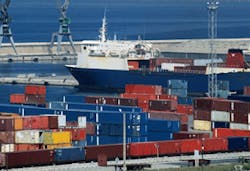PierPass Inc. has announced the scheduled March rollout of its voluntary security program at the Ports of Los Angeles and Long Beach. The setup will use RFID tag on trucks to verify the identity of the truck, the driver and the trucking company before entry is allowed to all 12 terminals.
Under the TruckTag program, truck drivers will obtain the first 10,000 tags purchased by terminal operators at no cost. The $1.2 million estimated cost of the program will cover the cost of the tags, their distribution, and the creation of a central security database that all terminals will draw from, PierPass said. This does not include the cost of an RFID reader, which runs from $1,200 to $1,400 each.
The system utilizes technology similar to the FasTrak and E-ZPass systems used for automated toll collection, PierPass said. When a tagged truck is at the terminal point of entry, an electronic reader automatically scans the RFID tag. The truck driver then simultaneously inserts his or her CDL to verify that the trucker has authorized business at the terminal. Currently, each drivers’ CDL is verified by a security guard at the point of entry.
Marine terminals are required by law to ensure that only those with proper business at the ports are permitted entry. PierPass describes the TruckTag initiative as a “proactive approach” to meeting port requirements.
“This tag leverages [a truck driver, vehicle and trucking company] database to each of the marine terminals,” Bruce Wargo, PierPass president & CEO told FleetOwner. “This program uniformly applies a process across all the terminals across the Ports of Los Angeles and Long Beach.”
Of the 10,000 available tags, over half of them have already been requested, Wargo added, indicating support from truckers. He expects that all of the tags will be distributed before mid-year, when the program is slated to be fully operational.
“It will eliminate the questioning and answering,” Wargo said. “‘Who are you’ and ‘who you drive for’ questions may go away and I think that’s a positive for them. Truckers have been fairly open to new things so long as it does improve their experience.”
WhereNet, which manufacturers the tags, is installing the RFID readers at each terminal. The tags install inside the truck cab.
Database company eModal, which already has 99% of the trucking companies working at the Ports registered to it, is responsible for building and maintaining the database.
For more information, go to www.pierpass.org.
